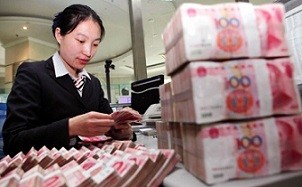The offshore yuan-based overnight Hong Kong interbank offered rate (HIBOR) has posted a record high of 66.8 percent on Tuesday, Jan. 12, up from 13.4 percent on Jan. 11 and 4.0 percent on Jan. 8, the Global Times reported.
The report said that the one-week rate also surged from 11.2 percent on Monday, Jan. 11, to 33.8 percent on Tuesday, Jan. 12.
According to data from Hong Kong's Treasury Markets Association, the spot offshore yuan rate was 6.5790 against the U.S. dollar as of 12:05 p.m. on Tuesday, while the spot onshore rate was 6.5750.
"The surge of the rate may have been caused by large-scale speculative capital flows, or a move by the Chinese government to curb currency depreciation by buying up yuan offshore," Zhou Yu, director of the Research Center of International Finance at the Shanghai Academy of Social Sciences, said.
The overnight offshore yuan-based HIBOR, a daily benchmark for offshore yuan interbank lending, includes overnight, one-week, two-week and one-month rates, which are calculated from rates contributed by 16 reference banks that are active in the yuan interbank market.
Zhou said that the HIBOR surge indicates tight liquidity for yuan offshore trading in Hong Kong.
Speculators take advantage of the exchange rate differences between the offshore and onshore yuan markets, hoping to make profits by buying yuan in the offshore market and then selling it in the onshore market, which contributes to the tight liquidity in the offshore yuan market in Hong Kong, Zhou noted.
Last week, the yuan exchange rate declined significantly, as the gap between the offshore and onshore yuan market expanded to record-high 1,600 basis points on Jan. 6, China Business News reported. This drove speculators to buy yuan in the offshore market and then sell it onshore.
Zhou added that it is also possible that the People's Bank of China (PBOC), the central bank, acting through state-owned banks in Hong Kong, may have bought yuan in the offshore market to curb market expectations for further yuan devaluation, which could also lead to tight liquidity in the offshore yuan market in Hong Kong.
Zhou said there have been expectations of further devaluation of the yuan in the offshore market since the PBOC adjusted the central parity rate formation system in Aug. 2015, which led to the weakening of the yuan against the U.S. dollar. He said foreign importers also plan to reduce the volume of their yuan holdings through trade settlement with their Chinese suppliers, which resulted in a flow of offshore yuan back to the mainland that reduced liquidity offshore.
Tan Yaling, head of the China Forex Investment Research Institute, said that a higher HIBOR rate would make it more expensive for investors to borrow yuan, which will affect investors anticipating further yuan devaluation.
"Furthermore, the move is a positive sign that China's central bank is prepared to support the value of offshore yuan, which is good news for stabilizing the yuan market offshore," said Tan.
"A higher HIBOR rate is effective for narrowing the gap between the offshore and onshore yuan rates, which leaves less space for speculators," Liu Dongliang, a senior analyst at China Merchants Bank, said.
Zhou noted that the gap between the offshore and onshore yuan market had almost disappeared on Tuesday, Jan. 12.



























